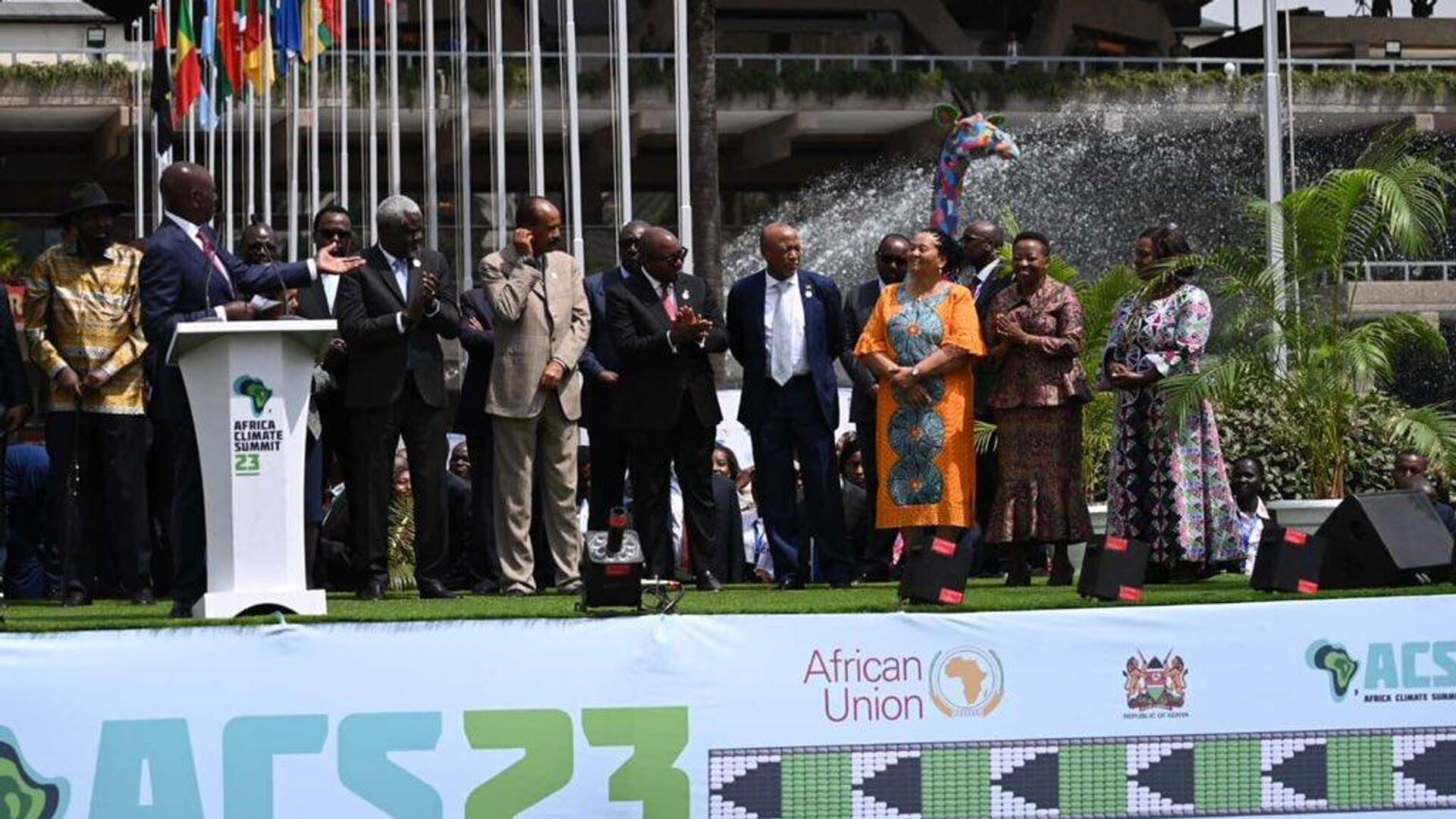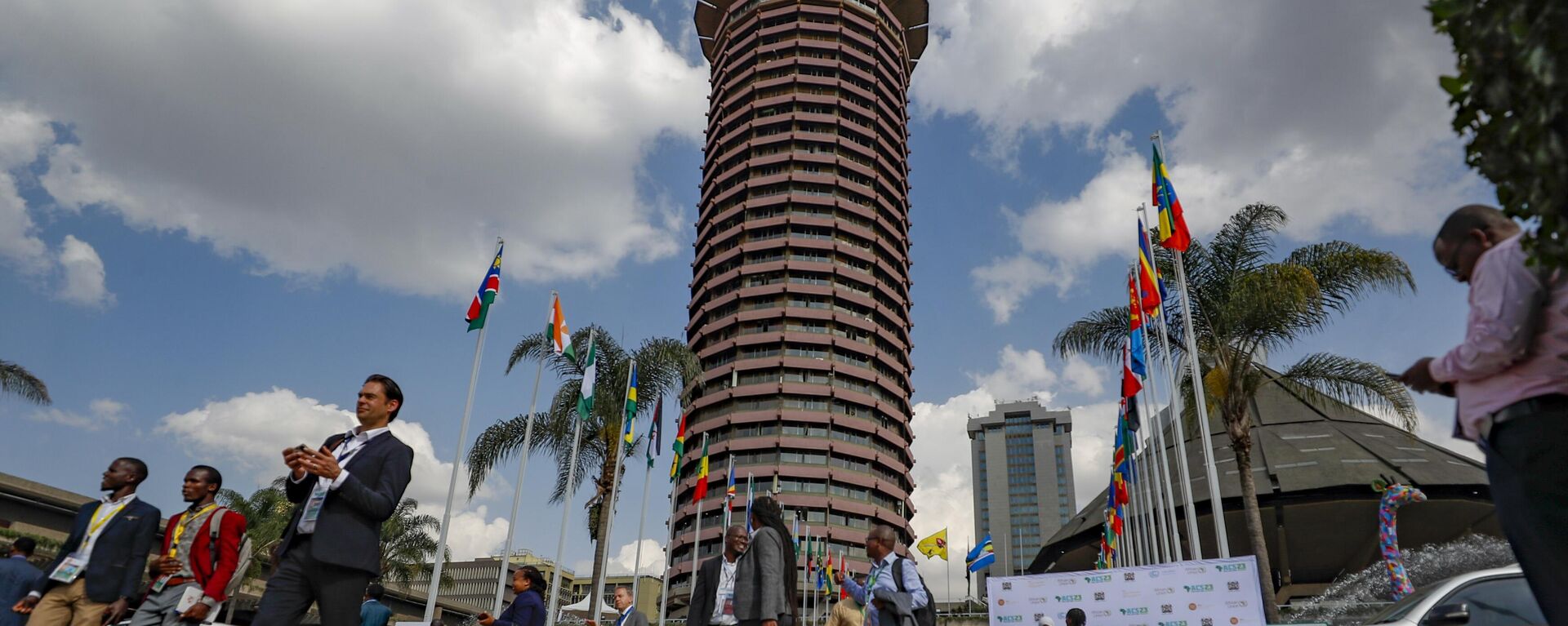https://en.sputniknews.africa/20230908/why-did-several-african-leaders-skip-kenyas-climate-summit-1061956584.html
Why Did Several African Leaders Skip Kenya's Climate Summit?
Why Did Several African Leaders Skip Kenya's Climate Summit?
Sputnik Africa
The first-ever African Climate Summit (ACS) was held in Nairobi, Kenya, from September 4-6, with 17 heads of state from the continent, UN Secretary-General... 08.09.2023, Sputnik Africa
2023-09-08T12:15+0200
2023-09-08T12:15+0200
2023-09-08T12:25+0200
sub-saharan africa
kenya
climate
east africa
south africa
southern africa
international
yoweri museveni
bola tinubu
cyril ramaphosa
https://cdn1.img.sputniknews.africa/img/07e7/09/08/1061957614_0:54:1024:630_1920x0_80_0_0_946a749f1bf99083acefaf2e05c2eb3d.jpg
Kenyan media outlet Nation has explained why Ugandan President Yoweri Museveni, Nigerian head Bola Tinubu and President Cyril Ramaphosa of South Africa did not attend the climate summit in Kenya's Nairobi.In Museveni's case, the media cited three senior Kenyan Foreign Ministry officials as saying that the Ugandan leader refused to "be lectured by US climate envoy John Kerry, who hails from a Global North country that is among the world's biggest polluters." The Ugandan leader's stance was articulated in his letter to the Kenyan leadership, according to Nation.In addition, Uganda's president has been reportedly reluctant to engage with the leadership of the US, which has condemned the East African nation's Anti-Homosexuality Act enacted in May for "human rights violations" and imposed travel restrictions against the country's officials, threatening other sanctions.The outlet explained the absence of the Nigerian leader in a similar vein.Bola Tinubu reportedly refused to attend the event as he was not keen to listen to the advice and directives of Western countries, who are themselves major polluters of the environment.Likewise, South African President Ramaphosa reportedly missed the summit since his government is protesting "pressure from some European partners" to embark on a transition to renewable sources and move away from coal, which accounts for 80% of the country's energy.According to the United Nations, Africa is not a significant source of greenhouse gas emissions, accounting for only 2–3% of the world’s carbon dioxide emissions from energy and industrial sources.The summit eventually adopted the Nairobi Declaration, which called for a "new financial architecture responsive to the continent's needs" and saw funding pledges worth $23 billion "for green growth, mitigation and adaptation efforts."During the summit, the UN chief Guterres urged G20 members, who are responsible for around 80% of global greenhouse gas emissions, to assume their responsibilities in tackling climate change.
https://en.sputniknews.africa/20230906/africa-climate-summit-reportedly-adopts-nairobi-declaration-1061921941.html
kenya
east africa
south africa
southern africa
uganda
nigeria
west africa
united states (us)
Sputnik Africa
feedback@sputniknews.com
+74956456601
MIA „Rossiya Segodnya“
2023
Maxim Grishenkin
https://cdn1.img.sputniknews.africa/img/07e7/0a/17/1063018107_0:0:1104:1103_100x100_80_0_0_03090c85a11f5d2e8a19cf1d989443c9.jpg
Maxim Grishenkin
https://cdn1.img.sputniknews.africa/img/07e7/0a/17/1063018107_0:0:1104:1103_100x100_80_0_0_03090c85a11f5d2e8a19cf1d989443c9.jpg
News
en_EN
Sputnik Africa
feedback@sputniknews.com
+74956456601
MIA „Rossiya Segodnya“
Sputnik Africa
feedback@sputniknews.com
+74956456601
MIA „Rossiya Segodnya“
Maxim Grishenkin
https://cdn1.img.sputniknews.africa/img/07e7/0a/17/1063018107_0:0:1104:1103_100x100_80_0_0_03090c85a11f5d2e8a19cf1d989443c9.jpg
kenya, climate, east africa, south africa, southern africa, international, yoweri museveni, bola tinubu, cyril ramaphosa, uganda, nigeria, west africa, united states (us)
kenya, climate, east africa, south africa, southern africa, international, yoweri museveni, bola tinubu, cyril ramaphosa, uganda, nigeria, west africa, united states (us)
Why Did Several African Leaders Skip Kenya's Climate Summit?
12:15 08.09.2023 (Updated: 12:25 08.09.2023) The first-ever African Climate Summit (ACS) was held in Nairobi, Kenya, from September 4-6, with 17 heads of state from the continent, UN Secretary-General Antonio Guterres and European Commission President Ursula von der Leyen in attendance. But three key African leaders were missing.
Kenyan media outlet Nation has explained why Ugandan President Yoweri Museveni, Nigerian head Bola Tinubu and President Cyril Ramaphosa of South Africa did not attend the climate summit in Kenya's Nairobi.
In Museveni's case, the media cited three senior Kenyan Foreign Ministry officials as saying that the Ugandan leader refused to "
be lectured by US climate envoy John Kerry, who hails from a
Global North country that is among the world's biggest polluters." The Ugandan leader's stance was articulated in his letter to the Kenyan leadership, according to
Nation.
"According to President Museveni, it was very disrespectful to sit in a room and be lectured on climate change by the very people who have plunged Africa and the Global South into this devastating crisis," the outlet reported, citing sources.
In addition, Uganda's president has been reportedly reluctant to engage with the leadership of the US, which has condemned the East African nation's Anti-Homosexuality Act enacted in May for "human rights violations" and imposed travel restrictions against the country's officials, threatening other sanctions.
"In his letter declining to attend the ACS, President Museveni made it clear that Africa is not a slave to anyone and reserves the right to conduct its own affairs as it sees fit," a source told local media.
The outlet explained the absence of the Nigerian leader in a similar vein.
Bola Tinubu reportedly refused to attend the event as he was not keen to listen to the advice and directives of
Western countries, who are themselves major polluters of the environment.
Likewise, South African President Ramaphosa reportedly missed the summit since his government is protesting "pressure from some European partners" to embark on a transition to renewable sources and move away from coal, which accounts for 80% of the country's energy.
"They simply did not want to be lectured to and be in the same room with European partners from the West who are the world leaders in pollution but who are planning to impose levies on certain carbon-intensive imports from South Africa at a time when they are struggling with load shedding," the outlet noted, citing sources.
According to the United Nations, Africa is not a significant source of greenhouse gas emissions, accounting for only 2–3% of the world’s carbon dioxide emissions from energy and industrial sources.
The ACS 2023 conference was organized by the African Union Commission in partnership with Kenya under the theme "Driving Green Growth and Climate Finance Solutions for Africa and the World."
The summit eventually adopted the Nairobi Declaration, which called for a "new financial architecture responsive to the continent's needs" and saw funding pledges worth $23 billion "for green growth, mitigation and adaptation efforts."
During the summit, the UN chief
Guterres urged G20 members, who are responsible for around 80% of global greenhouse gas emissions, to assume their responsibilities in tackling climate change.



